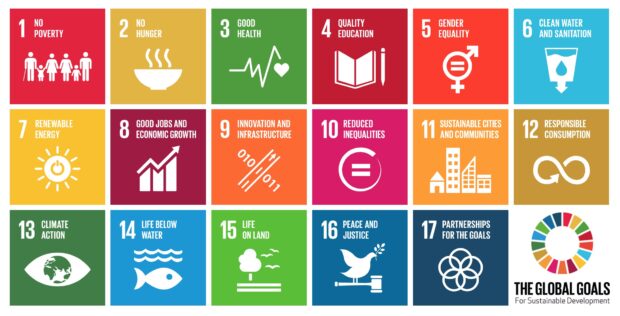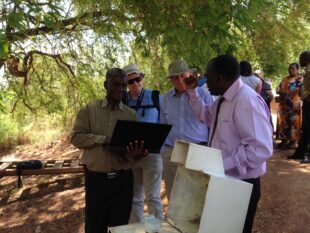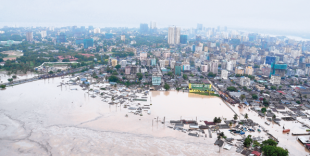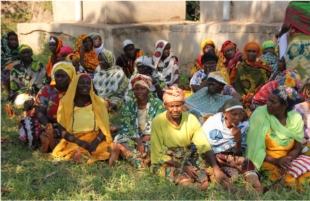I’ve just passed a major milestone: my one year anniversary of arriving in Tanzania.
Today also sees the launch of the amazing Project Everyone. If you’re a development person, you’ll know that the UN is about to agree a new set of goals to end extreme poverty by 2030. Project Everyone aims to explain these goals to 7 billion people in 7 days.

So I’ve been reflecting on my first year in Tanzania and how this dovetails with the 28 page document that World Leaders are going to endorse in New York.
To be honest, getting on the plane a year ago, I was full of Shakespearean romanticism: “I speak of Africa and Golden Joys”.
To be even more honest, I had a brutal coming together with reality in my first few weeks on the job. I arrived into the middle of a corruption scandal (‘escrow’ as my Tanzanians colleagues call it).
But I still managed to escape Dar es Salaam to travel the country. And my first major reflection, one year on, is that the job of the authorities - to support development - is bloody hard.
It’s only when you criss-cross the country in planes, cars and boats (I haven’t tried the trains yet) that you realise how big it is. In terms of land mass, Tanzania is four times bigger than the entire United Kingdom, but with around 45 million people. That’s means trying to reach poor people in low density, remote locations. And that is expensive…
… which is a real problem when you don’t have money. Last year, Tanzania raised about £3bn in its own revenues. That’s less than a third of what we spend running London.

And Tanzania doesn’t have that many people. The Rufiji River Basin office, for example, has about 20 civil servants to manage a basin the size of Scotland. By comparison, our Environment Agency has 10,000 people.
Those are just some headlines challenges. I won’t get into history (when Tanganyika gained independence, just over 50 years ago, there were about 11 secondary schools). Nor the exogenous factors, like global commodity prices.
But despite all this, Tanzania has been on an impressive journey. First, it is largely peaceful and its leaders stand down. By regional standards, that is special. Second, it has achieved around 7% growth a year for the last 10 years. Third, it has made some impressive human development gains: most children go to school and infant mortality and deaths from malaria have been halved.
Now don’t get me wrong. I’m not ignoring all the home-grown hurdles to development, like corruption and vested interest (some of which I’ve blogged about before). I’m just saying that I can’t help but admire a country that has made the sorts of gains that Tanzania has with the cards it was dealt.
But as I’ve settled into my year here, and learnt more, I’ve realised that the development challenge is getting harder, not easier.
In the next 15 years, there will be twice as many Tanzanians living in urban areas. Dar es Salaam will become a megacity. Tanzania will have to manage this with far fewer resources than other countries. When the East Asian tigers were at Tanzania’s current urban rate, their average income was 5 times higher.
At the same time, as I’ve previously blogged, Tanzania has a booming youth population. The World Bank estimates that the country needs to create 800,000 jobs a year to absorb them. To put that challenge in context, youth unemployment in the UK has fallen by 200,000 over the last five years.

Climate change will make everything harder. One example really captures this for me. 30% of Tanzania’s power comes from hydro. Most of that comes from one river basin: the Rufiji that I mentioned earlier. That basin also feeds some of the highest potential agricultural land as well as the largest Protected Park. And, it is rain-fed. So when the rains fail, so does power, agriculture and tourism.
Lastly, I’ve seen political scientists use the word ‘anocracies’ to describe countries that are neither fully autocratic nor fully democratic. Anocracries are about six times more likely than democracies to experience new outbreaks of conflict, i.e. the transition to a full democracy is messy. Tanzania only introduced multi-party politics in 1992, so it is still in this transition and we cannot be complacent about the risks of violence.
There are of course other things we need to think about: the discovery of natural gas and biodiversity to name a couple. But the point I'm making is that there are major trends already underway that are shaping Tanzania’s future.
Tanzania is not alone in this. So when you read through that 28-page “Agenda for Action” it is terrific to see that the #GlobalGoals resonate with the real challenges of today and tomorrow. So I’m a big fan (and have been tweeting about them @VelavanG). Importantly Goal 17 talks about new types of partnerships.
And that is where my second major reflection comes in: the reality of how we support development on the ground has some catching-up to do.
I’ve spent an inordinate amount of time in meetings, talking to other donors, debating sentences and agreeing what to say in other meetings. Coordination is important but has to be proportionate. Rakesh Rajani challenged me to spend more time talking to Tanzanians than other donors. I struggled with that in my early days.
The donors, and I include myself in this, have also tended to do things ‘to’ the country rather than listen to Tanzanians about what they want and how they want to do it. To be fair, that voice hasn’t always been forthcoming. But we need to get better at patient support. I’m a big believer in respect and humility as guiding principles.

And lastly, we need to mix up the range of voices we listen to. As you’ll have seen from my previous blog, we’ve brought young Tanzanians directly into our planning meetings. I want to take that further. Not just talking to our implementing partners but going directly to those whose lives we are trying to improve.
I’ll end with my two hopes for year two.
First, with Presidential elections here next month, I hope it’s ‘cometh the hour, cometh the man’ (and it will be a man I’m afraid).
Second, that we can drag #oldaid into modernity and help Tanzanians, especially the young, build the future they want.
Sorry a long blog. But it’s been a busy year.

1 comment
Comment by Pene K posted on
nice one. i will share to others.